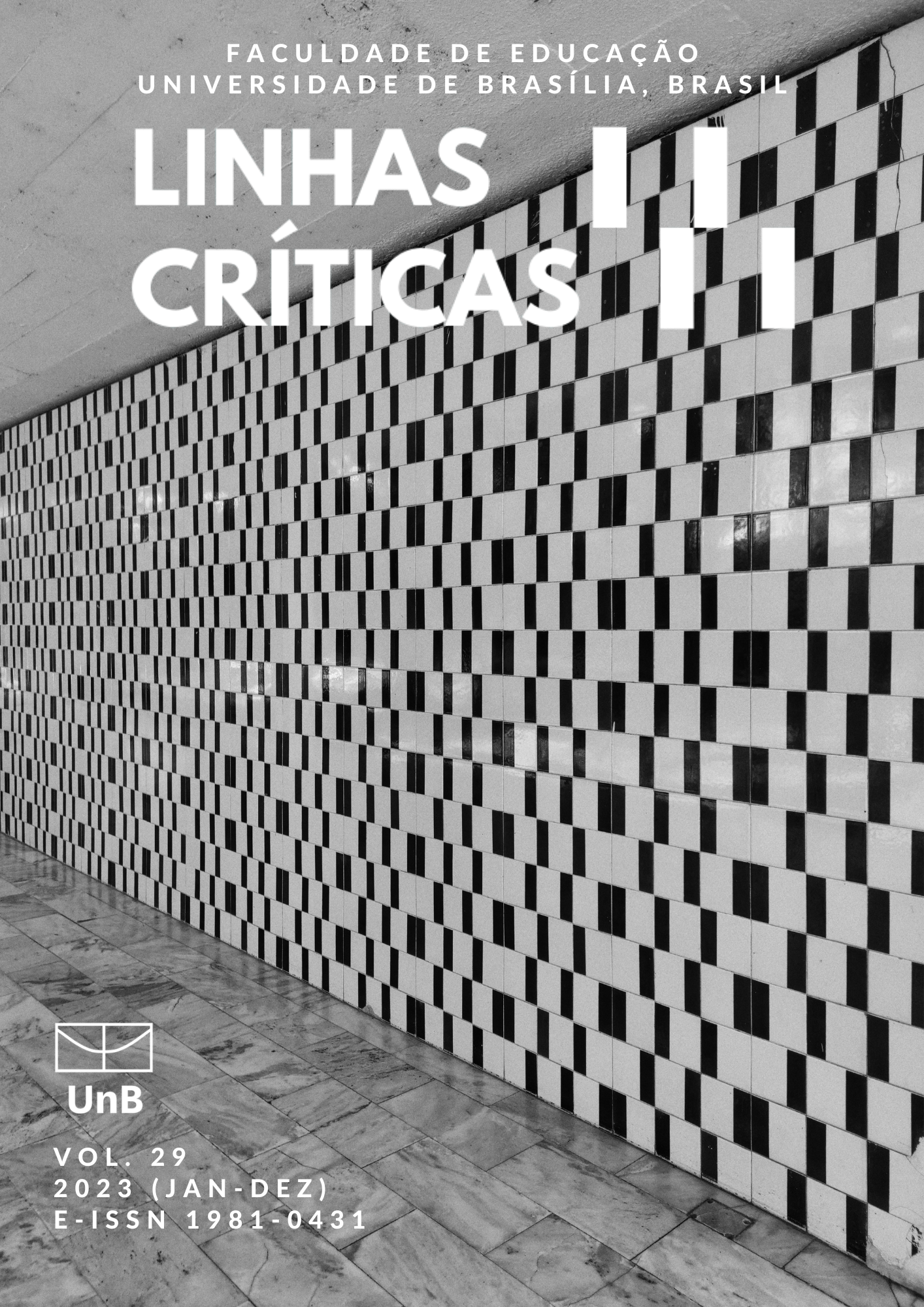Moral values for the Civic-Military Schools: heteronomy as educational project
DOI:
https://doi.org/10.26512/lc29202347077Keywords:
Civic-Military Schools, Moral Values, Moral HeteronomyAbstract
The present work intends to understand some aspects of the educational project underlying the implementation of Civic-Military Schools (ECIM) by the Bolsonaro government. To do so, we submitted to a hermeneutic analysis the moral values that, accompanied by the respective descriptors, are postulated by the Guidelines for Civic-Military Schools as a norm for ECIM: civility, honesty and respect. We conclude that such values, in the way they are situated, represent a strong predilection for moral heteronomy as an educational principle, distancing themselves, therefore, from the moral autonomy that would be favored by the democratization of school relations.
Downloads
References
Araújo, U. F. (2000). Escola, democracia e a construção de personalidades morais. Educação e Pesquisa, 26(2), 91-107. https://doi.org/10.1590/S1517-97022000000200007
Araújo, U. F. (2004). Assembléia Escolar: um caminho para a resolução de conflitos. Moderna.
Brasil. (1997). Parâmetros Curriculares Nacionais: apresentação dos temas transversais, ética. Ministério da Educação. http://portal.mec.gov.br/seb/arquivos/pdf/livro081.pdf
Brasil. (2019). Decreto-Lei n.º 10.004, de 05 de setembro de 2019 (Institui o Programa Nacional das Escolas Cívico-Militares). Poder Executivo. https://www2.camara.leg.br/legin/fed/decret/2019/decreto-10004-5-setembro-2019-789086-publicacaooriginal-159009-pe.html
Brasil. (2020). Constituição da República Federativa do Brasil: texto constitucional promulgado em 5 de outubro de 1988, compilado até a Emenda Constitucional no 105/2019. Coordenação de Edições Técnicas. https://www2.senado.leg.br/bdsf/bitstream/handle/id/566968/CF88_EC105_livro.pdf
Brasil. (2021). Diretrizes das Escolas Cívico-Militares. Ministério da Educação. https://www.gov.br/mec/pt-br/media/acesso_informacacao/pdf/10DIRETRIZESPECIMVERSO_observaes_14072021convertido2.pdf
Comte-Sponville, A. (2009). Pequeno Tratado das Grandes Virtudes. Martins Fontes.
Grizotes, B. de M. C., & Frick, L. T. (2021). Escolas cívico-militares e o desenvolvimento da moralidade. Schème: Revista Eletrônica de Psicologia e Epistemologia Genéticas, 13(2), 63–92. https://doi.org/10.36311/1984-1655.2021.v13n2.p63-92
Houaiss, A. (2001). Dicionário Houaiss da Língua Portuguesa. Objetiva.
Kohlberg, L. (1992) Psicologia del Desarrollo Moral. Desclée de Brouwer.
La Taille, Y. (2001). A questão da indisciplina: ética, virtudes e educação. Em P. Demo., Y. La Taille, & J. M. L. Hoffmann. Grandes pensadores em Educação – o desafio da aprendizagem da formação moral e da avaliação. Mediação.
La Taille, Y. (2006). Moral e Ética: dimensões intelectuais e afetivas. ArtMed.
La Taille, Y. (2010). Moral e Ética: uma leitura psicológica. Psicologia: Teoria e Pesquisa, 26(especial), 105-114. https://doi.org/10.1590/S0102-37722010000500009
La Taille, Y., Souza, L. S., & Vizioli, L. (2004). Ética e educação: uma revisão da literatura educacional de 1990 a 2003. Educação e Pesquisa, 30(1), 91-108. https://doi.org/10.1590/S1517-97022004000100006
Lueger, M., & Hoffmeyer-Zlotnik, J. H. P. (1994). Hermeneutic interpretation in qualitative research: between art and rules. Em I. Borg, & P. P. Mohler (Ed.). Trends and perspectives in empirical social research (pp. 294-307). De Gruyter.
Menin, M. S. D. S. (2002). Valores na escola. Educação e Pesquisa, 28(1), 91-100. https://doi.org/10.1590/S1517-97022002000100006
Menin, M. S. D. S., Shimizu, A. M., Bataglia, P. U. R., & Martins, R. A. (2014). Os fins e meios da Educação Moral nas escolas brasileiras: representações de educadores. Revista Portuguesa de Educação, 27(1), 133-155. https://doi.org/10.21814/rpe.4301
Oevermann, U. (2000). Die Methode der Fallrekonstruktion in der Grundlagenforschung sowie der klinischen und pädagogischen Praxis. Em K. Kraimer. Die Fallrekonstruktion (pp. 58-156). Verlag.
Piaget, J. (1994). O Juízo Moral na Criança. Summus.
Puig, L. M. (1995). Ética e Valores: métodos para um ensino transversal. Casa do Psicólogo.
Puig, L. M. (1998). A construção da personalidade moral. Ática.
Puig, L. M. (2000). Democracia e participação escolar. Moderna.
Reichertz, J. (2004). Objective hermeneutics and hermeneutic sociology of knowledge. Em U. Flick, E. V. Kardorff, & I. Steinke. (Eds.). A companion to qualitative research (pp. 290-296). Sage.
Santos, C. A., Alves, M. F., Mocarzel, M., Mohelecke, S. (2019). Militarização das escolas públicas no Brasil: um debate necessário. Revista Brasileira de Política e Administração da Educação, 35(3), 580-591. https://doi.org/10.21573/vol35n32019.99295
Santos, E. J. F. (2020). Militarização das escolas públicas no Brasil: expansão, significados e tendências. [Dissertação de mestrado, Universidade Federal de Goiás]. Repositório institucional da UFG. http://repositorio.bc.ufg.br/tede/handle/tede/11015
Vilela, R. A. T., & Noack-Napoles, J. (2010). “Hermenêutica Objetiva” e sua apropriação na pesquisa empírica na área da educação. Linhas Críticas, 16(31), 305-326. https://doi.org/10.26512/lc.v16i31.3618
Vinha, T. P. (1999). O educador e a moralidade infantil numa perspectiva construtivista. Revista do Cogeime, 14(1), 15-38. https://www.metodista.br/revistas/revistas cogeime/index.php/COGEIME/article/view/506/459
Vinha, T., Nunes, C. A. A., Menin, M. S. S., Tognetta, L. R. P., & Moro, A. (2021). A educação para o desenvolvimento da autonomia e a militarização nas escolas públicas: uma análise de psicologia moral. Em M. Abramovay, E. Figueiredo, A. P. da Silva, & M. V. Sales. (Orgs.). Reflexões sobre convivências e violências nas escolas (pp. 84-107). Flacso. https://flacso.org.br/files/2021/11/RCVE.pdf
Wernet, A. (2009). Einführung in die Interpretationstechnik der objektiven Hermeneutik (3 Auflage). Verlag für Sozialwissenschaften.
Published
How to Cite
Issue
Section
License
Copyright (c) 2023 Rafael Pétta Daud, Luiz Antônio Calmon Nabuco Lastória, João Mauro Gomes Vieira de Carvalho, Pedro Luís Panigassi

This work is licensed under a Creative Commons Attribution 4.0 International License.
Authors who publish in this journal agree to the following terms:
-Authors maintains the copyright and grants the journal the right of first publication, the work being simultaneously licensed under the Creative Commons Attribution License which allows the sharing of the work with recognition of the authorship of the work and initial publication in this journal.
- Authors are authorized to enter into additional contracts separately, for non-exclusive distribution of the version of the work published in this journal (eg publish in institutional repository or as a book chapter), with acknowledgment of authorship and initial publication in this journal.
-Authorers are allowed and encouraged to publish and distribute their work online (eg in institutional repositories or on their personal page) at any point before or during the editorial process, as this can generate productive changes as well as increase the impact and the citation of published work (See The Effect of Free Access).



